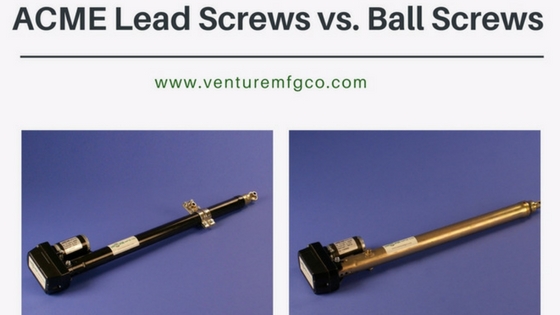In today’s automated environment, the demand for effective linear motion control systems like lead screws is extremely high. Most lead screws initiate motion by turning either the nut or the screw. Acme lead screws and ball screws are two of the most effective lead screws used today. What makes them different? How do they add value to equipment or systems? This post answers all these questions. Read the post to know more.
A Brief Explanation on Acme Screw Actuators & Ball Screw Actuators
The most basic difference between these two types of actuators lies in their mechanics.
- Acme screws are distinguished by their trapezoidal thread, which rolls on the lead screw to create a motion. In Acme screw actuators, linear force is transmitted to the nut by the rotating shaft. Efficiency of the linear motion depends on various factors such as lead screw, nut material, and lubrication. Most times, nuts are made from materials such as polymers, self-lubricating plastics, and metals like bronze, or brass. Nonmetallic nuts require no lubrication, and have low coefficient of friction. Both these characteristics contribute to their higher efficiencies. Metallic nuts are well-known for their load bearing properties, but they require lubrication, and high frictional forces.
- Ball screws are distinguishable due to their circular threads on the nut and the screw. These circular threads serve as helical raceway for ball bearings. The ball bearings roll through circular threads when the nut or screw moves. This rolling movement creates a linear motion.
Uses and Advantages of Acme Screw Linear Actuators and Ball Screw Linear Actuators
Firstly, let’s understand the advantages of Acme screw linear actuators.
- Acme screw linear actuators produce no noise because there are no rolling components.
- These actuators are ideal choice for vertical, as well as light load applications.
- The preloaded nut assembly in these actuators help reduce or completely eliminate backlash. This boosts application scope of these actuators.
- These actuators are safe to operate when the unit has a static load to hold.
- Lead screws are self-locking, which means there is no need to apply brakes, even in situations of power outage.
- Acme screw actuators are extremely affordable because they have low manufacturing costs.
Ball screw linear actuators are valued for their following advantages:
- Ball screws can carry heavy loads than Acme screw actuators.
- In these actuators, the screw thread and the nut don’t make a direct contact, but they always move along the rolling ball bearings. Hence, the low friction helps improve its speed, force, and duty cycle rating. Also, the low friction aids to its longer life cycle, and less motor power is required to drive them.
- The most common applications of these actuators include robots, aircraft, power steering, and semiconductors.
- These actuators can turn rotational motion into straight motion, and vice-versa.
As seen, both these variants have their own benefits. Thus, the choice will entirely depend on your application requirements.
Most linear actuator manufacturers in USA provide either of these two actuators in various specifications. However, your applications may have special requirements. In such cases, it is always better to opt for custom designed ball screws or Acme lead screws. There are very few linear actuator manufacturers who can provide you customized actuation solutions. Venture Mfg. Co. is one such Acme lead screw and ball screw linear actuators manufacturer who specialize in customized solutions.

